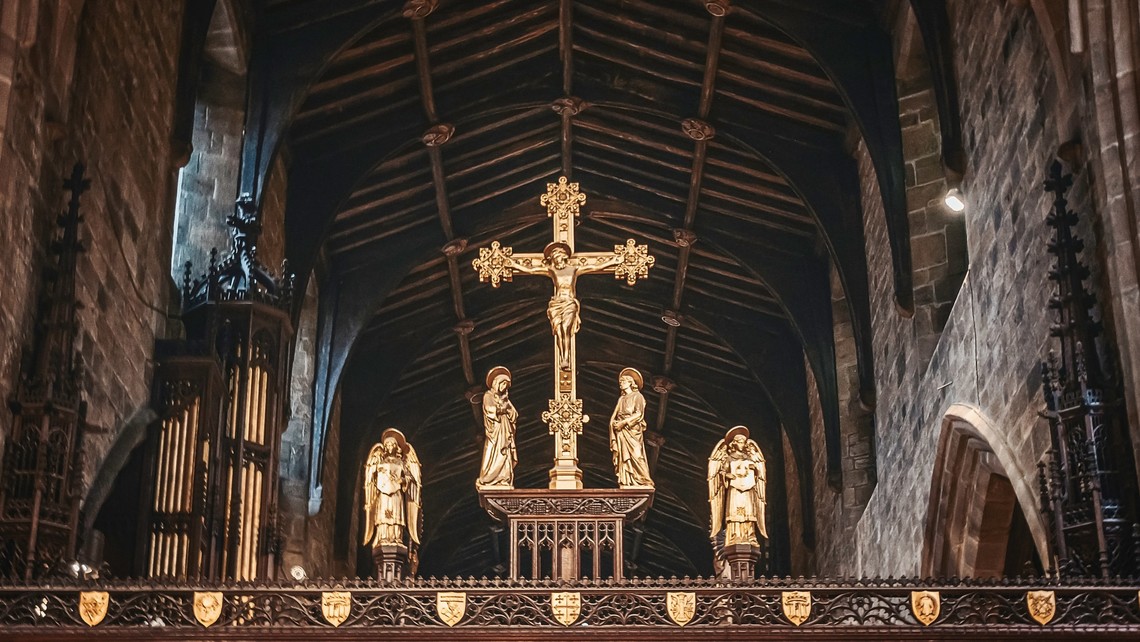
Places in the New Testament where we read of “the brothers of the Lord” or of the Lord’s “brethren” have lead some to think that the Blessed Virgin Mary had other children besides Jesus. Of course, that’s not possible, because she is the Blessed Ever-Virgin Mary. The idea that Mary was not a perpetual Virgin and had other children is an idea that far predates the Protestants, the two most notable heretics being Helvidius (4th century) and in general a strange group of Christians called the Antidicomarianites which lasted from the 3rd to 5 th centuries. This strange sect refused to accord any special status to Mary, not only rejecting the doctrine of her perpetual virginity which was taught from Apostolic times, even believing Joseph to be the biological father of Jesus.
The resolution to the problem is actually very simple when we consider that the word for “brother” in Hebrew usage is loosely extended to all near, or even distant, relatives. To prove the point, all we need to do is to research those three who are often called “brethren” of the Lord to see what Scripture has to say of them. These three are the two apostles named James and John the Apostle. In Galatians 1:19 we read, “But other of the apostles [besides Cephas] I saw none, saving James the brother of the Lord”; and in Acts 9:27 we read “James the brother of the Lord.”
As you know, there were two Apostles named James: James the son of Zebedee, and James the son of Alpheus (Matthew 10:3; Mark 3:18; Luke 6:16; Acts 1:13). In Acts 12:12, it says that Herod “had James, the brother of John, put to death with the sword.” So this James, often called James the Greater because he was the older of the two James, had Zebedee for his father. Since the martyrdom of this James takes place before the Council of Jerusalem in Acts 15, then the other James (St. James the Less) who was present as the Bishop of Jerusalem (Acts 12:17, 15:13, 21:18; Galatians 1:19; 2:9-12) must have been the son of Alphaeus. As for John, clearly his father is identified as Zebedee.
Since Joseph is not the Father of any of these three apostles, then Mary the Mother of God cannot be the Mother of any of them. As for the possibility that Mary remarried and that these are children by her second and third marriages, you can immediately see how silly this idea is when we realize that the earliest Joseph could have died was immediately after Jesus was lost in the Temple when he was 13, making the ages of these three apostles in question between 12 and 15 years at the start of Jesus’ ministry; which is, in other words, impossible.
Despite what is argued above, many still hold that Mary had other children besides Jesus due to two passages in the Gospels. The first in Matt 1:25: “He [Joseph] knew her not till she brought forth her firstborn son”; and the second in Luke 2:7: “And she brought forth her firstborn son” (emphasis mine).
However, the word Luke uses for “firstborn” (prototokos), does not require that other children were born afterwards. Prototokos connotes more than birth order. It would be quite natural therefore to call an only child “firstborn,” especially if that child was a boy, because prototokos indicates the special privilege marked upon that child which opens the womb, the one to which the majority of blessings and inheritance is to be given.
Finally, as for Matthew’s “knew her not until” this would seem more of a challenge, since the verb “to know” is used in the context of marriage to imply conjugal relations, and “till” means “until the time when.” However, what seems to be an insurmountable problem when translated into English crumbles when considered in the Greek and Hebrew. In fact St. Jerome when writing against Helvidius and his heresy, gives many examples in of the exact construction as Matthew 1:25, in which it is very clear that what takes place after the “until” is of no import at all. As one example, 2 Samuel 6:23 states “Therefore Michal the daughter of Saul had no child until the day of her death.” Does this mean that Michal must have begun to have children after she died? Of course not! That’s because with this sort of sentence construction, it’s only the period of time up to the “until” that is of concern. Luke is actually using the “until” construction along with “knew her not” to emphasize that Joseph and Mary really and truly had no carnal relations as a cause of Jesus’ conception or birth, one of the most important historical facts to prove Christian doctrine of Christ’s dual nature as man and God. To capture the meaning better, one could loosely translate Matthew 1:25 in this way: “And I tell you Joseph did not have intimate relations with Mary in any way whatsoever up to and until Jesus was born.”






